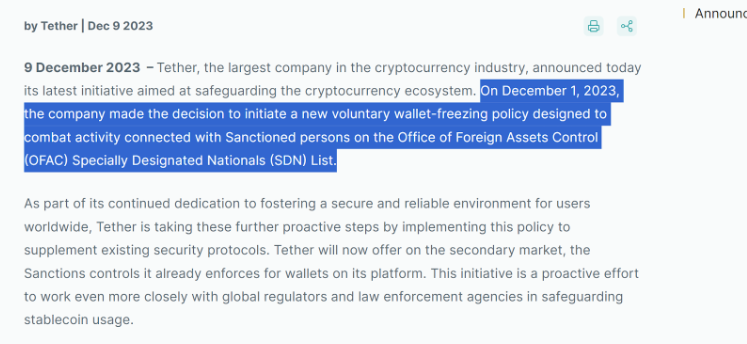Cryptocurrencies have long been associated with concerns about illicit activities and their potential use by sanctioned individuals. Tether, one of the leading stablecoin providers, has proactively addressed these concerns in a groundbreaking move.
The company recently announced that it would voluntarily block wallets associated with individuals on the OFAC (Office of Foreign Assets Control) denylist, signaling a commitment to creating a compliant crypto ecosystem.

The original post can be viewed here.
Table of Contents,
Enhancing Global Security and Compliance
Tether’s decision to block wallets aligns with its mission to provide users a safe and reliable environment worldwide. By voluntarily adhering to OFAC regulations, the company aims to strengthen its relationships with law enforcement agencies and regulators. The move also signifies Tether’s commitment to promoting the positive use of stablecoin technology and fostering a secure ecosystem.
Independent Freezing of Addresses
To demonstrate its commitment, Tether has initiated the independent freezing of addresses newly added to the SDN (Specially Designated Nationals and Blocked Persons) denylist. This list, maintained by the U.S. government, targets individuals involved in terrorism or international crime or associated with authoritarian regimes. By taking this proactive measure, Tether aims to prevent any misuse of its stablecoin and uphold compliance standards.
Securing the Network
Tether has already taken concrete steps to back its commitment. The company recently froze 161 addresses that were listed on the SDN Denylist. This action showcases Tether’s dedication to compliance and serves as a model for other cryptocurrency platforms to actively engage in ensuring a secure environment.
Tether’s initiative goes beyond mere compliance; it underscores the positive potential of stablecoin technology. By actively blocking addresses associated with sanctioned individuals, Tether aims to contribute to the broader narrative of cryptocurrencies being a force for good. This move may pave the way for increased trust and adoption of stablecoins in the mainstream financial landscape.
Challenges and Opportunities Ahead
While Tether’s voluntary actions are commendable, they also raise questions about the broader implications for decentralized finance (DeFi) and the principles of censorship resistance. Striking a balance between compliance and the foundational tenets of cryptocurrencies remains a challenge that the industry must navigate.
Discover more stories! The Crypto Industry Is Urged to Curb Terrorism Financing
A Step Towards a Responsible Crypto Future
Tether’s decision to voluntarily block wallets from the OFAC denylist marks a pivotal moment in the crypto industry. It reflects a commitment to responsible and compliant practices, contributing to the positive evolution of stablecoin technology. Tether’s proactive stance sets a precedent for other market players as the crypto landscape evolves, signaling the potential for a safer and more secure crypto ecosystem.



